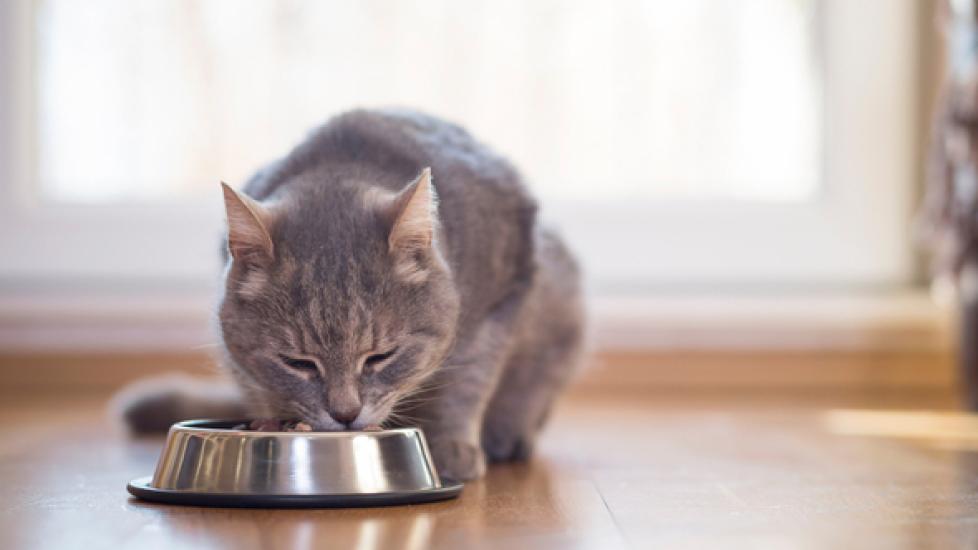Kidney Diets for Cats: What to Look for
By Jennifer Coates, DVM
Kidney disease is extremely common in cats. It can develop quickly, because of something like an infection or exposure to antifreeze, or over many years for no apparent reason. Symptoms and treatment for kidney disease vary depending the specifics of the case, but oftentimes, a diet change can help.
Why Diet Matters
The kidneys have many roles in the body. Two of these major roles include removing waste products from the bloodstream and conserving water. When kidney function declines past a certain point, toxic waste products like urea and phosphorous begin to back up within the body, which can make a cat feel terrible. Poor kidney function also leads to dehydration because more water than normal is lost in the urine.
Both of these problems can be at least partially addressed with diet. Foods that have a high water content can help prevent dehydration, and when cats eat a diet made from moderate amounts of high quality protein, they produce less urea and phosphorous that then needs to be eliminated.
Over-the-Counter Foods
Cats who are in the early stages of kidney disease often thrive when fed an appropriate, over-the-counter food. Canned foods are best because they contain much more water than dry foods, but you still need to make sure the diet is made from high-quality ingredients.
Look for animal-based protein sources (chicken, beef, salmon, etc.) that sound like something you might eat rather than a byproduct of a manufacturing process. If your cat simply will not eat canned food, choose a dry food that is made from high-quality ingredients and do everything you can to encourage your cat to drink a lot of water. If your cat eats dry food, you may need to start giving subcutaneous fluids (fluids injected under the skin) sooner than you would otherwise.
Determining the right protein level for your cat’s food is tricky. Too much protein will increase the amount of urea and phosphorous the body needs to get rid of. On the other hand, cats with chronic kidney disease often suffer from muscle wasting, and too little protein can make this problem worse. Your veterinarian is the best person to make a recommendation regarding an appropriate dietary protein level for your cat.
Prescription Foods
Cats with more advanced cases of kidney disease can benefit from eating a prescription food. Prescription kidney diets tend to provide a moderate level of protein but are quite low in phosphorous, which helps keep the production of waste products as low as possible. These foods also usually have a reduced sodium content to prevent dehydration, are high in specific amino acids to promote muscle mass and contain other ingredients, like omega-3 fatty acids, that support kidney health.
Prescription kidney diets are available in canned and dry formulations, but once again, canned is usually best because of its high water content. The biggest problem with these foods is that cats will sometimes refuse to eat them. Manufacturers have worked hard to make their products tastier than they used to be, but you may still need to try several before you find one that your cat will relish.
Homemade and Raw Foods
When a cat is not eating enough to maintain a healthy weight, that particular food is failing to meet his or her nutritional needs even if it looks like it should be a good choice. The solution may be as simple as trying a different brand of prescription kidney diet or over-the-counter food, but if you’re willing to cook for your cat, a homemade diet might also be a good option. Homemade foods are usually so tasty that they will improve almost any cat’s appetite.
However, homemade diets can also be dangerous. Studies have shown that the majority of homemade pet diets are nutritionally incomplete, and this is especially true for the kidney disease recipes that you can find online or in books. Raw diets can also be risky for sick cats because their immune systems are not as strong as they once were and uncooked meat in particular can expose cats to potentially dangerous food-borne pathogens.
Before feeding your cat a raw or home cooked diet, talk to your veterinarian and/or a veterinary nutritionist who can put together a safe and nutritious recipe that will meet all of your cat’s needs.
